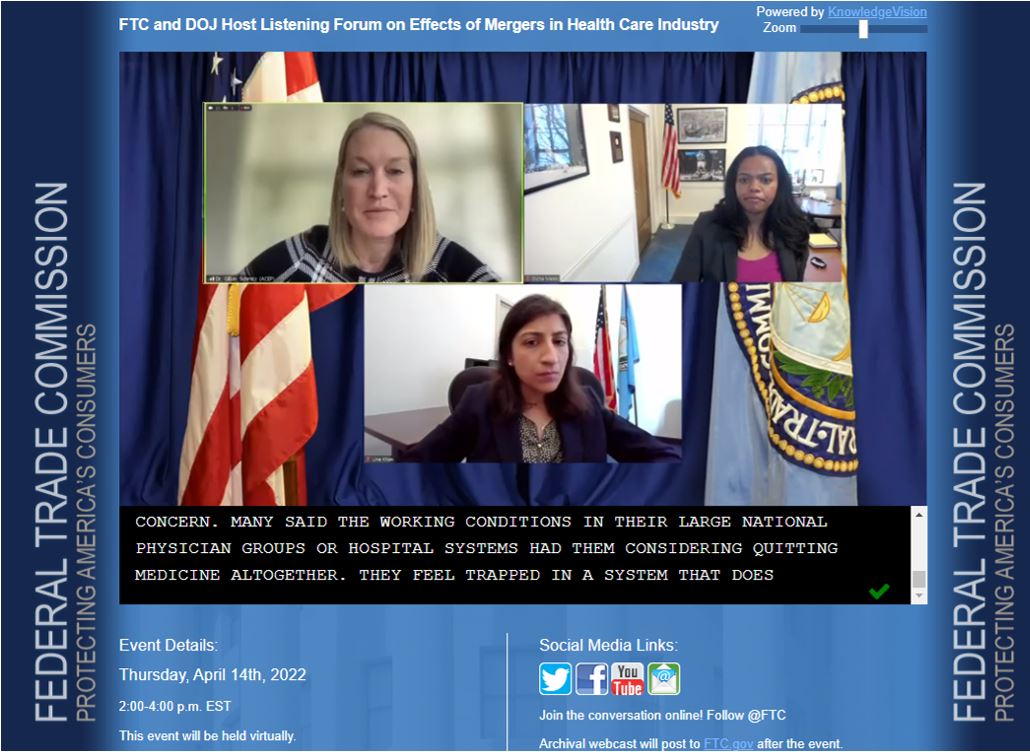The issue of consolidation in health care continues to be front and center in emergency medicine (EM). ACEP has been exploring how the acquisition of EM practices has affected EM physicians' working conditions and overall well-being. Recently, the Federal Trade Commission (FTC) and Department of Justice (DOJ) released a request for information (RFI) on how to modernize their guidelines for enforcing anti-trust laws regarding mergers. Previously, the government guidelines for examining mergers have focused only on mergers’ direct impact on competition, but wanting to modernize these guidelines, the FTC sought feedback on the effect mergers can have on labor conditions.
To help inform our response, ACEP distributed a questionnaire to members asking about experiences with such mergers, and received over 110 responses sharing their stories about how they were impacted, whether positively or negatively.
These responses were analyzed for trends, and summarized in our official response to the RFI, along with our recommendations to the FTC and DOJ for changes to their merger guidelines.
ACEP Testifies at FTC Listening Session
On April 14, ACEP President Dr. Gillian Schmitz and ACEP Executive Director Sue Sedory provided public comments in a listening session hosted by the FTC and DOJ on the effects of mergers and acquisitions in the healthcare industry. In their comments, which can be viewed in full below, Dr. Schmitz and Ms. Sedory shared results from ACEP's story collection that showed numerous anti-competitive labor-related effects associated with mergers and acquisitions in emergency medicine including:
- Reduced wages and/or non-cash benefits.
- Infringement of due process rights.
- Interference with physician autonomy to make independent medical decisions benefiting patients.
- Inability to find a job or undue imposed restrictions on ability to switch jobs.
- A shift to use of a less-skilled health care workforce jeopardizing patient care.

Gillian Schmitz Remarks in FTC Listening Session

Good afternoon. I am Gillian Schmitz, President of the American College of Emergency Physicians.
Many people aren’t aware that emergency medicine physicians work in a variety of employment models. While some are employed directly by hospitals, many are employed by independent entities that contract with the hospital to provide emergency department coverage 24x7. Lately, a high number of these independent practices have been acquired by hospitals, health systems, and corporate entities (such as private equity and health insurance companies).
The recent questionnaire we put out to our members clearly demonstrated negative first-hand impacts of mergers and acquisitions on our workforce.
More than half indicated their medical decision-making autonomy was negatively impacted by merger or acquisition of their employer. Emergency physicians train for years and are highly skilled in diagnosing and treating medical conditions in the most urgent situations. Interference in their medical decision making can significantly impact safety and quality of care for patients.
More than half indicated their due process rights worsened or were eliminated after a merger. Due process plays a foundational role in ensuring a physician can carry out their promise to patients without fear of retribution or termination by their employer, so further erosion in contracts following acquisition is a significant concern.
Many said the current working conditions in their large, national physician groups or hospital systems have them considering quitting medicine altogether. They feel trapped in a system that does not respect their autonomy or mental well-being and have no other options available for them and their families. A significant exodus of emergency physicians from the workforce threatens the healthcare safety net that emergency medicine provides, and the last two years have shown how very important that net is.
We urge FTC and DOJ to include detailed review of these types of labor-related impacts in its updated guidelines and follow-through on investigating those mergers that have led directly to the anti-competitive and harmful practices impacting our livelihoods.
Thank you.
Gillian Schmitz, MD, FACEP
Sue Sedory Remarks in FTC Listening Session

Good afternoon. I’m Sue Sedory, Executive Director and CEO at the American College of Emergency Physicians.
On behalf of our 40,000 members, we appreciate the opportunity to share what we’re hearing about the first-hand effects of mergers and acquisitions in emergency medicine.
The impact of the consolidation of emergency physician practices on both physicians and their patients is of great concern to us, particularly in light of the high rate of acquisition by hospitals, health systems, and corporate entities (such as private equity and health insurance companies).
To inform our insights, we recently distributed a questionnaire to our members asking about their first-hand experiences with acquisitions.
We received over 110 responses which showed:
- While some noted a positive impact in negotiating more fairly with insurance companies, most noted numerous anti-competitive labor-related effects including:
- Reduced wages and/or Non-cash Benefits
- Infringement of due process rights
- Interference with physician autonomy to make independent medical decisions benefiting patients.
- Inability to find a job or undue imposed restrictions on ability to switch jobs
- A shift to use of a less-skilled health care workforce jeopardizing patient care.
- Specific to labor market competition, 63% indicated that the merger made it more difficult to find and/or keep a job.
- For wages, 60% indicated their compensation had been reduced, with most experiencing a pay cut of more than 20 percent
- And of the 40% who experienced no change in pay or a pay raise after the merger, many noted that their overall hours were cut.
Given these findings, we recommend the FTC and DOJ update their guidelines for evaluating mergers to include a detailed assessment of these types of labor-related impacts. Once the guidelines have been revised, it is important to investigate mergers that have led directly to the anti-competitive and harmful practices we documented. Having updated guidelines without any weight of enforcement behind them is only half a solution.
Thank you.
Susan Sedory, MA, CAE








